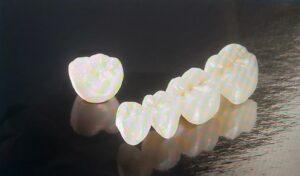
Importance of Dental Crown
The dental crown, which resembles the crown of a tooth, secures the dentition just above gingival margin. Dental crowns are one of the most flexible prostheses available. Dentists typically use them to reinforce, repair, and improve the appearance of dentition. Most difficulties can be handled with crowns, so search no further for a sensible solution that provides maximum safety.
Dental crowns are thus among the most common prostheses used in dentistry. We offer a range of crown implants based on the required treatment. You can get in touch with us for any questions regarding dental crowns.
Let us take a look at how dental crowns play an important role in maintaining oral hygiene.
The visible tooth is protected with dental crowns.
The crown serves as a “shield” for the tooth’s surface layers. Some patients prefer stain – resistant crowns (for inner tooth replacements) or glass linked to metal restorations over steel caps (for back teeth). Because no immediate force is given to the teeth, dental crowns aid in the long-term preservation of the dentition.
Dental crowns give the repaired tooth additional reinforcement.
An endodontic treatment procedure entails removing all of the tooth’s core and fibres, which are necessary for maintaining it intact. The material in the tooth will dry out and become fragile once the fibres and tissue have been extracted. To give the repaired tooth more strength, the dentist plugs the space and tops it with a crown. This protects the teeth from any further fractures and injury.
Dental crowns have a pleasing appearance.
Dental crowns complete dental procedures such as implant placement. It improves the appearance and durability of the impacted teeth. A dental crown may be used to hide a discoloured or misshapen tooth that is irreversible. Dental crowns are designed to match in with the surrounding teeth, therefore if you have a molar that appears to be out of place, a dental crown will be used to reestablish the contour.
Dental crowns are used to provide the necessary oral stability.
Dental crowns give the stability that your substitute teeth need when you remove a tooth. After inserting the pillar into the jaw and allowing the bone to bond it in position, a crown would be fitted on the bridge to reestablish the mouth’s structure and function. Your dental bridge is held in place by a crowns, which allows you to eat, laugh, and talk publicly.
These are the types of factors that would surely lead to the use of dental crowns. The newest dental crowns have a natural appearance and are prone to occur out or become loose in the near future. You should, nevertheless, take excellent care of the teeth after receiving the crown(s) in order to keep things in good shape.
The process of placing dental crowns is both simple and cost-effective.